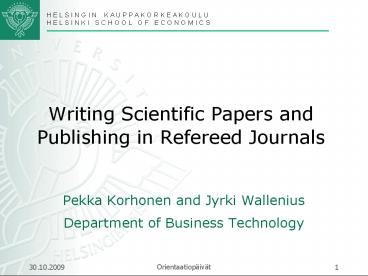Writing Scientific Papers and Publishing in Refereed Journals PowerPoint PPT Presentation
1 / 17
Title: Writing Scientific Papers and Publishing in Refereed Journals
1
Writing Scientific Papers and Publishing in
Refereed Journals
- Pekka Korhonen and Jyrki Wallenius
- Department of Business Technology
2
What is Research?
- Activity producing results, which scientists
publish as scientific papers
Research
3
Example Calls to Service Numbers of Mobile
Operators
- To collect information about calls to service
numbers - To classify customers based on their calls
- To create customer profiles according to their
calls - To understand and explain the behavior of
customers - To build a model to explain the impact of mobile
technology on the behavior of human beings
4
Research ? Good Research
- Good Research
- To produce new knowledge based on scientific
research with an aim to contribute to your own
scientific field - Research results to be evaluated by the
scientific community (i.e. are submitted for
possible publication) - Acceptance of scientific community means that the
articles have to be published in good refereed
journals and are widely cited
5
Criteria for Good Research
- New ideas (innovative not imitated)
- Importance of research problem
- Scientific methods
- Logical argumentation
- Scientific writing, publishing
- Promotion of research results (conference
presentations etc.)
6
Guidelines for Good Scientific Writing
- Write from the readers point of view
- Write with clarity using illustrations and
examples - Write logically, precisely, and objectively
- Write as simply as possible - but not simpler
(Albert Einstein) - Cover the subject completely
- Correctness and consistency
- Be convincing
- Keep up readers interest
- Revise, revise and revise
7
Channels for Publishing
- Refereed Journals
- Books and Book Chapters
- Conference Proceedings
- Discussion and Working Papers
- Research Reports
- Management Oriented Papers
- Book Reviews
8
Publishing Process
Working paper
9
Referee-Process
- Currently papers will normally be submitted
electronically through a journals web page.
(Never submit your paper to more than one journal
at the same time.) - An editor or an associate editor familiar with
the topic will process the paper. - Editor (Associate Editor) sends the article to
2-3 referees not known to the author. (In some
cases, the editor will reject the paper
immediately, if the language is poor or the topic
is not relevant to the journal.) - The referees recommend acceptance, revision, or
rejection. Reviews may be in conflict.
10
Referee-Process ...
- Editor (Associate Editor) makes the decision
acceptance, (major/minor) revision, or rejection.
(The paper is very seldom accepted as such. If
not rejected immediately, the paper has usually
to undergo 1-3 revision rounds.) - If rejected, make a revision and submit it to a
new journal. (Acceptance rate usually varies
between 10-60.)
11
Guidelines for Preparing the Revision
- The revised paper will be resent in most cases to
the same referees. Thus - take the comments into account as well as you
can! - prepare a response letter in which you respond to
the referees comments point by point! - Avoid saying that the referee is wrong even
though it is true. You may always blame your poor
writing and say that you have improved the
wordings in the revision. - Be always positive and grateful that somebody
has evaluated your paper without any compensation
!!!!
12
What Aspects do the Referees Focus on?
- Is the topic of the paper suitable to the
journal? - Does the paper need a revision?
- Is the work original?
- Does it contain a contribution and is the
contribution clearly presented? - Is the paper free of errors, and are the methods
correctly applied? - Is the paper clearly written? Is the title
appropriate? Is the abstract good? Are the
references complete? - Could it benefit from condensation or expansion?
13
What Kind of Papers are Accepted?
- Articles must be readable, well-organized, and
exhibit good writing style. Other important
criteria are originality and significant
contribution including the capacity to provide
generalizations within the framework of
application-oriented methods. (Management
Science)
14
Which Journal ?
- Submit your paper always to a good journal. (Do
not over-/underestimate your contribution! Ask
your supervisor for advise.) - A good journal a journal which is cited much.
- Most of good journals are listed in ISI Web of
Science Data Base. - Various research institutes and universities have
their own lists of good journals (see, e.g. HEC
School of Management, Wirtschaftsuniversität
Wien, French National Committee for Scientific
Research, Bocconi University, EconPapers (RePec))
15
Impact Factor
- ISI journals have an annually published impact
factor, which describes the impact of the
journal, more precisely - The journal impact factor is a measure of the
frequency with which the "average article" in a
journal has been cited in a particular year. (For
the papers published in year t, the impact factor
counts the citations in years t1 and t2 divided
by 2.) - At HSE, the rector has defined that a top
journal is one with an impact factor 1. - To find ISI Web of Science go to HSE home page ?
Library ? Digital Campuslibrary ? ISI Web of
Science.
16
Summa Summarum
- Choose a relevant and interesting research topic!
- Conduct your research professionally!
- Communicate your results effectively!
- Publish in good journals!
- Promote your paper in various forums! (You market
yourself via scientific achievements.)
17
Summa Summarum
- ?
- Your paper gets noticed and read.
- Your paper is cited.
- Follow-up research is conducted based on your
paper. - Young scholar will become known in the scientific
community. (Your recognizition in the scientific
community depends on the achievements of your
scientific works.) - Friends help open doors for you, but you have
to earn the respect of the scientific community
yourself.

